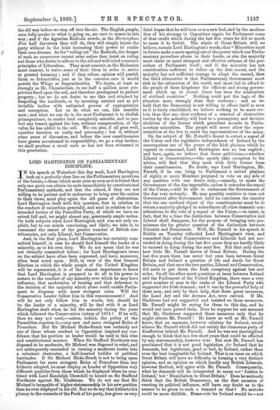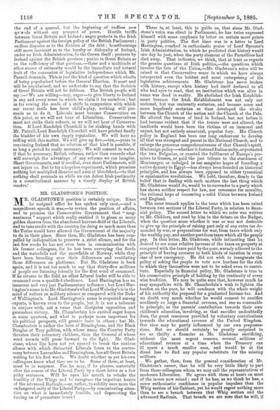LORD HARTINGTON ON PARLIAMENTARY DISCIPLINE.
IN his speech at Waterfoot this day week, Lord Hartington took up a perfectly clear line on the Parliamentary questions of the future,—those which must arise so soon as it is found that only one party can obtain its ends immediately by constitutional Parliamentary methods, and that the others, if they are not willing to be patient and to endeavour to bring over the nation to their views, must play again the old game of obstruction. Lord Hartington dealt with this question, first in relation to the conduct of minorities generally, and next in relation to the intended tactics of the Parnellite Party, of which we have re- ceived full and, we might almost say, generously ample notice. On both subjects what Lord Harlington said was not only ex- plicit, but to our minds convincing, and likely, we take it, to command the assent of the greater number of British con- stituencies, not only Liberal, but Conservative. And, in the first place, Lord Hartington has certainly com- mitted himself, in case he should find himself the leader of a minority, as to his own duty. We do not mean that he was not virtually committed before ; for Lord Hartington's views on the subject have often been expressed, and have, moreover, often been acted upon. Still, in view of the first General Election in which the whole people of the United Kingdom will be represented, it is of the utmost importance to know that Lord Hartington is prepared to do all in his power to restore to the conduct of any minority over which he may have influence, that moderation of bearing and that deference to the decision of the majority which alone could enable Parlia- ment to dispense with more stringent rules. Will the Conservative Leader follow him in this announcement ? And will he not only follow him in words, but, should he be the leader of a minority, will he deal with it as Lord Hartington dealt when he led the minority during the years which followed the Conservative victory of 1874 ? If he will, then we may not need,—unless, indeed, the policy of the Parnellites requires it,—any new and more stringent Rules of Procedure. But Sir Michael Hicks-Beach was certainly not one of those whose conduct in Opposition inspired any con- fidence that his position as leader would be used in this wise and constitutional manner. When Sir Stafford Northcote was disposed to be moderate, Sir Michael was disposed to rebel, and not unfrequently succeeded in turning a moderate leader into a reluctant obstructor, a half-hearted builder of political barricades. If Sir Michael Hicks-Beach is not to bring upon Parliament far more stringent Rules of Procedure than any hitherto adopted, he must display as Leader of Opposition very different qualities from those which he displayed when he com- bined with Lord Randolph Churchill to hound on Sir Stafford Northcote against Mr. Gladstone. We do not say that Sir Michael is incapable of higher statesmanship in his new position than he ever displayed in his old. But we do say that hitherto his pliancy to the counsels of the Puck of his party, has given us very
faint hopes that he will turn over a new leaf, and by the modera- tion of his strategy in Opposition regain for Parliament some of that credit which during the last five years he did so much to cause it to forfeit. The whole of Great Britain will, we believe, sustain Lord Hartington's words, that "Minorities must in future make a more sparing use of the power which our Parlia- mentary procedure places in their hands, or else the majority must insist on more stringent and effective reforms of the pro- cedure of Parliament itself ; and if the minority has not consideration sufficient to follow up the first course, and the majority has not sufficient courage to adopt the second, then the third alternative is that Parliamentary Government must sink in the estimation of the world, and must fail to afford to the people of these kingdoms the efficient and strong govern- ment which up to recent times has been the admiration of civilised countries." Nothing could put the logic of the situation more strongly than that sentence ; and as we hold that the Democracy is not willing to efface itself as soon as it is fairly established, we believe nothing to be more cer- tain than that any clear evidence of a renewal of obstructive tactics by the minority, will lead to a peremptory and decisive abolition of the license which precedent accords to Parlia- mentary minorities. The people will never allow the repre- sentatives of the few to mock the representatives of the many.
On the subject of Mr. Parnell's threat to extort a repeal of the Union and the legislative independence of Ireland by the unscrupulous use of the power of the Irish phalanx which he expects to command, Lord Hartington was no less explicit ; and here, again, we believe that those politicians,—whether Liberal or Conservative,—who openly take exception to his advice, will find that they meet with little favour from their constituencies. No doubt, says Lord Hartington, Mr. Parnell, if he can bring to Parliament a united phalanx of eighty or more Members prepared to vote on any side of any question with one desire only,—namely, to make the Government of the day impossible, unless it concedes the repeal of the Union,—will be able to embarrass the Government of the day very seriously. He may possibly contrive to turn out Government after Government, until he convinces the country that the one cardinal object of the constituencies must be to return a majority pledged to subordinate all other domestic con- siderations to the veto of a repeal of the Union,—to insist, in fact, that for a time the distinction between Conservative and Liberal shall disappear, for the purpose . of bringing into pro- minence the far greater question of the distinction between Unionist and Disunionist. Well, Mr. Parnell in his speech in Dublin on Tuesday ridiculed Lord Hartington's view, and remarked that what Conservatives and Liberals had not suc- ceeded in doing during the last five years they are hardly likely to succeed in doing during the next five. But that only shows how little Mr. Parnell knows of Great Britain. During the last five years there has never but once been between Great Britain and Ireland a question of life and death for Great Britain, and that once the two parties, Liberal and Conservative, did unite to put down the Irish conspiracy against law and order. On all the other moot questions at issue between Ireland and the Parliament of the United Kingdom, there were a very great number of men in the ranks of the Liberal Party who supported the Irish demand ; and it was by the powerful help of these men, and only by their help, that those great measures, the Land Act and the Arrears Act, were carried. If Mr. Gladstone had not supported and insisted on those measures, Mr. Parnell might be crying for them to this day, and he would not have gained them. Does he suppose for one moment that Mr. Gladstone supported those measures only that he might silence Mr. Parnell ? He knew as well as Mr. Parnell knew, that no measure, however salutary for Ireland, would silence Mr. Parnell which did not satisfy the clamorous party of disaffection behind Mr. Parnell. And he was not shortsighted enough to think that in a few short years that could be effected by any statesmanship, however wise. But now Mr. Parnell has proclaimed that it is not good legislation for Ireland that he demands, but legislation, good or bad, by Ireland, rather than even the best imaginable for Ireland. That is an issue on which Great Britain will have no difficulty in forming a very distinct opinion, and an opinion on which hardly any British Liberals, however Radical, will agree with Mr. Parnell. Consequently, what he demands will be interpreted to mean not Justice to Ireland,' but Humiliation to Great Britain.' Does he seriously think that the British Democracy, on the first occasion of exerting its political influence, will have any doubt as to the answer to be given to such a demand as that V No mistake could be more childish. Home-rule for Ireland would be—not the end of a quarrel, but the beginning of endless new qtrrrels without any prospect of peace. Hostile tariffs between Great Britain and Ireland ; angry protests in the Irish Parliament against the foreign policy of the British Parliament ; endless disputes as to the division of the debt ; heartburnings still more incessant as to the loyalty or disloyalty of Ireland, under an Irish Administration, to the Crown itself ; protests by Ireland against the British garrison ; panics in Great Britain as to the sufficiency of that garrison,—these and a multitude of other causes of animosity would be the immediate and natural fruit of the concession of legislative independence which Mr. Parnell demands. This is just the kind of question which admits of being popularised before the General Election. It must and will be popularised, and we undertake to say that the decision of Great Britain will not be dubious. The British people will say We are willing—nay, eager—to give liberty to Ireland in any and every sense in which we claim it for ourselves ; but as for sowing the seeds of a strife in comparison with which our recent strife has been child's-play, nothing will per- suade us to do it. Liberals must become Conservative on this point, or we will not hear of Liberalism. Conservatives must not strike their colours, or we will not hear of Conserva- tism. If Lord Randolph Churchill is for shaking hands with Mr. Parnell, Lord Randolph Churchill will have pricked finally the bladder of his own empty reputation, We will have no trifling with this matter. We will give up five,—ten,--years to convincing Ireland that no solution of that kind is possible, if so long a period be really necessary. We will consent to waive, if that be necessary, British reforms, rather than concede what will outweigh the advantage of any reforms we can imagine. Short Governments, and if needful, even short Parliaments, will not injure us. But to try a hopeless experiment, which promises nothing but multiplied disaster and a sea of bloodshed,—to that nothing shall persuade us while we can defeat Irish pertinacity in a constitutional manner by a timely display of British resolve.'



































 Previous page
Previous page